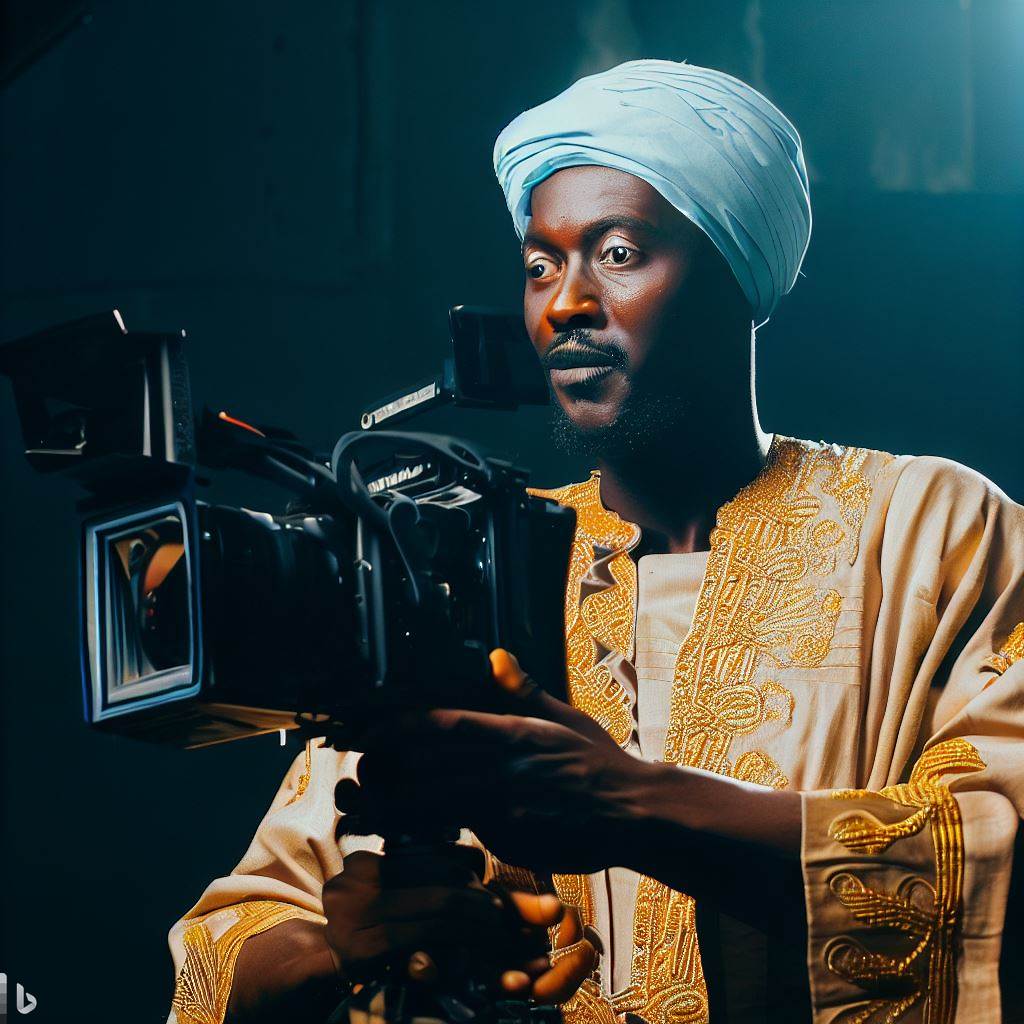Introduction
Cinematography training is of great importance in Nigeria as it helps aspiring filmmakers acquire the necessary skills.
In this blog post, we will provide an overview of available training opportunities in Nigeria.
Cinematography is a crucial aspect of filmmaking, as it involves capturing and creating visually compelling scenes. It requires technical knowledge in areas such as camera operation, lighting, composition, and storytelling.
In Nigeria, the film industry, known as Nollywood, is the second largest in the world in terms of film output.
However, the country lacks quality cinematography due to limited training opportunities. This has led to subpar visual storytelling in Nigerian films.
The importance of cinematography training in Nigeria cannot be overstated. Proper training equips filmmakers with the skills needed to create visually stunning and engaging films.
It enables them to effectively use camera angles, lighting techniques, and composition to enhance storytelling.
This blog post aims to provide aspiring Nigerian filmmakers with information on available cinematography training opportunities in the country.
We will discuss various institutions, workshops, and online resources that offer training programs in cinematography.
By showcasing the different options available, we hope to encourage individuals passionate about filmmaking to pursue their dreams and acquire the necessary skills to excel in cinematography.
In the following sections, we will delve into specific training opportunities, highlighting the curriculum, duration, and eligibility requirements.
We will also provide recommendations based on reviews and testimonials from past trainees.
Overall, this blog post serves as a comprehensive guide for aspiring cinematographers in Nigeria, helping them navigate the available training options and embark on a successful filmmaking career.
Overview of the Nigerian Film Industry
A. Brief history and growth of Nollywood
Nigeria’s film industry, known as Nollywood, has experienced rapid growth since its inception.
Started in the late 1990s, Nollywood has become the second-largest film industry globally.
Nollywood films are known for their unique storytelling techniques, often incorporating traditional African elements.
Over the years, Nollywood has produced a vast number of films, catering to various genres and audiences.
B. Rise in demand for trained cinematographers
The growth of Nollywood has led to a heightened demand for trained cinematographers, emphasizing cinematography’s critical role in filmmaking.
Cinematography involves visual capture and manipulation to convey storytelling and emotions, significantly impacting a film’s look and feel.
A skilled cinematographer enhances a movie’s quality with artistic vision and technical prowess.
Numerous training opportunities have emerged in Nigeria to meet this demand.
The Nigerian Film Institute (NFI) in Jos, Plateau State, offers a comprehensive curriculum covering various filmmaking aspects, including cinematography. Students gain hands-on experience from industry experts.
The Multichoice Talent Factory (MTF), a Pan-African initiative, combines theoretical and practical training in cinematography and related disciplines within its one-year program.
Industry veterans host workshops and masterclasses, providing practical insights and networking opportunities for aspiring cinematographers.
Attending Nigeria’s renowned film festivals like the Africa International Film Festival (AFRIFF) and the Nigerian International Film Summit (NIFS) enables knowledge expansion and connections with industry professionals.
Networking is paramount in the film industry, and aspiring cinematographers should actively engage with professionals by attending events, joining filmmaking associations, and seeking mentorship.
Investing in quality equipment is crucial, with budget-friendly options available for beginners.
These initiatives and opportunities reflect the growing recognition of cinematography’s significance in Nollywood’s expansion, ensuring a steady stream of skilled professionals to elevate the industry’s standards.
Benefits of Cinematography Training
Cinematography training offers numerous benefits that can help aspiring filmmakers and photographers improve their craft.
In this section, we will discuss three major advantages of undergoing cinematography training in Nigeria.
A. Improved technical skills
Cinematography training provides a platform for individuals to enhance their technical skills in handling cameras, lighting, and other equipment.
Participants gain practical knowledge, learning different techniques such as shot composition, exposure, and camera movements.
This training enables individuals to capture high-quality images and videos, making them more competitive in the industry.
B. Enhancing creativity and storytelling abilities
Cinematography training in Nigeria helps individuals develop their creativity and storytelling abilities.
Participants learn how to effectively convey emotions, messages, and narratives through visual storytelling techniques.
They explore different styles, aesthetics, and visual elements that can be used to enhance the overall impact of their films and photographs.
By honing their creative skills, trainees can produce captivating visuals that engage and captivate audiences.
C. Networking and industry connections
One of the significant benefits of cinematography training is the opportunity to network and build connections within the industry.
Participants get a chance to collaborate with fellow trainees, instructors, and professionals working in the field.
This networking can lead to job opportunities, mentorship, and collaborations on future projects.
The training institutes often bring in guest speakers from the industry, enabling trainees to interact with experienced professionals and gain valuable insights into the industry’s workings.
In addition to these benefits, cinematography training helps individuals gain a deeper understanding of the industry trends, techniques, and equipment.
They learn about the latest advancements in camera technology, post-production software, and visual effects.
This knowledge empowers trainees to stay updated with industry standards and gives them a competitive edge in the job market.
Moreover, cinematography training provides a structured learning environment where trainees receive feedback and guidance from experienced professionals.
They can learn from their peers, exchange ideas, and receive constructive criticism to improve their work.
This supportive environment helps individuals grow as filmmakers and photographers, pushing their creative boundaries and refining their skills.
Furthermore, undergoing cinematography training in Nigeria opens doors to various career opportunities.
The film and photography industry in Nigeria is thriving, with an increasing demand for professionals with technical expertise and creative vision.
Trainees can find employment in film production companies, advertising agencies, television stations, or work as freelancers on independent projects.
The skills acquired during the training make them versatile and marketable in different industry sectors.
The benefits of cinematography training in Nigeria are numerous. Trainees can improve their technical skills, enhance creativity and storytelling abilities, and build valuable industry connections.
This training equips individuals with practical knowledge, enabling them to produce high-quality visuals and pursue a successful career in the competitive field of cinematography.
Cinematography Training Options in Nigeria
Cinematography training options in Nigeria vary from film schools to online courses, providing aspiring filmmakers with diverse learning opportunities.
This section will explore the different avenues available for individuals interested in honing their skills in cinematography.
A. Film schools and academies offering cinematography courses
- Nigerian Film Institute (NFI): Renowned for its comprehensive film programs, NFI offers cinematography courses to equip students with technical skills.
- Royal Arts Academy: With a focus on practical training, this academy provides hands-on experience in cinematography through their courses.
- PEFTI Film Institute: This institute offers structured programs in cinematography, enabling students to develop a solid foundation in the field.
- Lagos State University School of Communication: Recognized for its film and media programs, the school offers cinematography courses at the undergraduate and postgraduate levels.
B. Notable institutions and their reputations
- Pan-Atlantic University School of Media and Communication: Offers a well-rounded education in cinematography, emphasizing creativity and technical proficiency.
- Nigeria Film Corp (NFC): Known for its collaboration with international filmmakers, NFC provides opportunities for learning and networking.
- Del-York International: A renowned media training organization that offers cinematography courses for aspiring filmmakers in Nigeria.
C. Online courses and resources for self-learning
- Cinemascope: An online platform that provides cinematography courses, tutorials, and resources for self-paced learning.
- Udemy: Offers a wide range of online cinematography courses taught by industry professionals.
- YouTube tutorials: Numerous cinematography experts share their knowledge on YouTube, making it a valuable resource for self-learners.
- Online forums and communities: Platforms like filmmaking forums and social media groups allow filmmakers to connect, share ideas, and learn from one another.
By exploring these various options, aspiring cinematographers have the opportunity to choose the avenue that aligns with their learning style and goals.
Film schools and academies offer structured programs that provide comprehensive training and hands-on experience.
Notable institutions and their reputations ensure students receive quality education from respected institutions.
Online courses cater to those seeking convenience and flexibility, allowing individuals to learn at their own pace.
Additionally, resources such as Cinemascope, Udemy, YouTube tutorials, and online communities enable self-learners to access valuable information.
When selecting a training option, consider factors such as the curriculum, faculty expertise, and practical opportunities offered.
Research the reputation and track record of the institutions or platforms, ensuring they align with your career aspirations.
Additionally, consider whether you prefer a structured program or self-paced learning, as this will influence your choice.
Remember, cinematography is an art form that requires both technical knowledge and artistic sensibility.
While training resources are valuable, practical experience and continuous learning are essential to excel in this field.
Read: Success Stories of Prominent Nigerian Music Publishers
Curriculum and Content of Cinematography Training
In order to become a skilled cinematographer, it is essential to undergo comprehensive training.
Cinematography training programs in Nigeria offer a wide range of courses that cover various aspects of the craft.
These courses focus on providing aspiring cinematographers with the knowledge and skills needed to excel in the industry.
Some of the key components of the curriculum include:
A. Basic Principles and Techniques of Cinematography
This course introduces students to the fundamental principles and techniques of cinematography.
It covers topics such as camera placement, shot composition, and visual storytelling.
Students learn how to effectively use angles, perspectives, and camera movement to enhance the visual appeal of their shots.
B. Camera Operation and Equipment Handling
In this course, students are taught how to operate different types of cameras and handle professional cinematography equipment.
They learn about camera settings, lens selection, and various camera movements.
Hands-on training helps students become familiar with different camera models and gain practical experience in operating them effectively.
C. Lighting, Composition, and Shot Framing
Lighting is a crucial element in cinematography. This course focuses on teaching students how to manipulate and utilize light to create visually appealing scenes.
Students learn about different lighting techniques, color temperatures, and the use of lighting to convey mood and atmosphere in a shot.
Additionally, they gain knowledge about shot composition and framing techniques that contribute to the overall visual aesthetic of a film.
D. Audio Recording and Sound Design
Sound plays a vital role in cinematography, and this course trains students in recording high-quality audio and designing sound for films.
Students learn about audio equipment, microphone placement, and sound recording techniques.
They also gain an understanding of sound editing and mixing, which is essential in enhancing the overall audio experience of a film.
E. Editing and Post-Production Skills
This course focuses on the post-production phase of cinematography. Students learn about editing software, techniques, and workflows.
They gain hands-on experience in editing footage, applying special effects, and creating a cohesive final product.
Additionally, students learn about color grading, which involves enhancing and manipulating the visual appearance of a film through color correction.
By covering these essential components, cinematography training programs in Nigeria equip aspiring cinematographers with a strong foundation in the art and craft of filmmaking.
The curriculum is designed to provide a comprehensive understanding of the technical aspects of cinematography, along with the creative skills necessary to bring a director’s vision to life.
Through hands-on training and practical experience, students develop the necessary expertise to excel in the industry.
Cinematography training programs in Nigeria cover various topics, such as basic principles, camera operation, lighting, composition, audio recording, editing, and post-production skills.
These courses provide aspiring cinematographers with the necessary knowledge and skills to pursue a successful career in the industry.
With a solid foundation in cinematography, graduates can contribute towards the growth and development of the Nigerian film industry, showcasing their talent on both local and international platforms.
Read: How Music Publishers are Shaping Nigerian Music

Case Studies of Successful Nigerian Cinematographers
1. Tunde Kelani
Born in Lagos, Tunde Kelani is a highly regarded Nigerian cinematographer and director.
He began his career in the 1970s and has since gained recognition for his exceptional work in the Nigerian film industry.
Kelani is known for his unique storytelling approach and his expertise in capturing the cultural essence of Nigeria.
He has worked on numerous critically acclaimed projects, including “Saworoide,” “Thunderbolt,” and “Maami”.
Kelani’s remarkable contributions have been recognized with several prestigious awards, such as the Africa Movie Academy Award for Best Cinematography.
2. Remi Adefarasin
With a career spanning over three decades, Remi Adefarasin is a prominent Nigerian cinematographer who has achieved global recognition.
He has worked on various international productions, collaborating with renowned directors such as Steven Spielberg and Ridley Scott.
Adefarasin’s exceptional talent can be seen in films like “Elizabeth,” “Match Point,” and “Johnny English Reborn”.
His outstanding contributions to the film industry led him to receive several awards, including the British Academy of Film and Television Arts (BAFTA) Award for Best Cinematography.
3. Yinka Edward
Yinka Edward is an up-and-coming Nigerian cinematographer who is making waves in the industry.
He has worked on a range of projects, from short films to feature-length movies. Edward’s keen eye for detail and unique visual style have captivated audiences.
He has worked on notable projects such as “The Milkmaid” and “Oko Ashewo,” garnering critical acclaim and earning him the Africa Magic Viewers’ Choice Awards for Best Cinematography.
These case studies highlight the diversity and talent within the Nigerian cinematography industry.
The success of these cinematographers serves as an inspiration for aspiring filmmakers in Nigeria, showing that with dedication and skill, they too can make significant contributions to the world of cinematography.
Read: Insider’s Guide to Music Licensing in Nigeria
Challenges and Opportunities in the Nigerian Cinematography Industry
The Nigerian cinematography industry is faced with numerous challenges and opportunities.
In order to thrive in this competitive field, it is important to be aware of these factors and strategize accordingly.
A. Challenges
- Lack of adequate training facilities and resources: One of the major challenges in the Nigerian cinematography industry is the shortage of training facilities and resources.
Many aspiring cinematographers struggle to find proper training programs and equipment to enhance their skills. - Limited job opportunities and competition: The industry is highly competitive, with limited job opportunities available.
As a result, cinematographers face strong competition to secure projects and establish their careers.
B. Opportunities
- Emerging opportunities in digital content creation: The rise of digital platforms has created new opportunities for cinematographers in Nigeria.
Online streaming platforms, social media, and independent production houses are seeking quality content. - Growing demand for local stories: The Nigerian film industry, often referred to as Nollywood, is the second-largest in the world.
There is an increasing demand for local stories, providing cinematographers with a chance to showcase their skills. - Rising popularity of Nigerian music videos: Nigerian music has gained international recognition, resulting in a surge in demand for well-crafted music videos.
This presents an avenue for cinematographers to showcase their skills in visual storytelling. - Collaboration with international production companies: With Nigeria gaining global recognition for its film industry, there is an opportunity for local cinematographers to collaborate with international production companies. This can lead to exposure and career growth.
- Government support for the film industry: The Nigerian government has shown support for the film industry through initiatives such as grants, tax incentives, and film festivals.
These efforts create opportunities for cinematographers to access funding and showcase their work.
The cinematography industry in Nigeria faces challenges such as the lack of training facilities and resources, limited job opportunities, and competition.
However, there are also numerous opportunities emerging, such as digital content creation, the demand for local stories, and collaborations with international production companies.
By understanding these challenges and capitalising on the available opportunities, cinematographers can navigate the industry and thrive in their careers.
Read: Collaboration in Music: The Publisher’s Role in Nigeria
Delve into the Subject: Royalties in Nigeria: A Music Publisher’s Perspective
Scholarships, Grants, and Funding for Cinematography Training
When it comes to pursuing a career in cinematography, the cost of training can be a significant barrier for many aspiring cinematographers.
However, there are numerous organizations, initiatives, scholarships, grants, and funding options available in Nigeria that can help make this dream a reality.
A. Organizations and Initiatives Supporting Aspiring Cinematographers
- The Nigerian Film Corporation (NFC) : The NFC provides support and funding for training in various fields of filmmaking, including cinematography.
- National Film and Video Censors Board (NFVCB) : The NFVCB offers grants and scholarships to individuals interested in pursuing cinematography training.
- The Nigerian Film Institute (NFI) : The NFI provides specialized training programs for aspiring cinematographers.
- The Nigerian Society of Cinematographers (NSC) : The NSC promotes the art and science of cinematography in Nigeria and provides mentorship opportunities.
B. Available Scholarships and Grants in Nigeria
- The Nigerian Film Fund (NFF) : This fund offers scholarships and grants to talented individuals pursuing cinematography training.
- The Nigerian Women in Film (NWIF) Fund : This fund specifically supports female cinematographers and offers grants and scholarships.
- The Nigerian Cultural Endowment Fund (NCEF) : The NCEF provides financial assistance to individuals involved in artistic projects, including cinematography.
C. Funding Options for Pursuing Further Studies Abroad
- The British Council : The British Council offers scholarships and grants for Nigerian cinematographers seeking to study abroad.
- Fulbright Foreign Student Program : This program provides scholarships for Nigerian students to pursue cinematography training in the United States.
- Commonwealth Scholarships : Nigerian cinematographers can apply for Commonwealth Scholarships to study cinematography in various countries.
- Private Foundations and Trusts : There are several private foundations and trusts that offer scholarships and grants for cinematography training abroad.
It is essential for aspiring cinematographers to explore these opportunities and thoroughly research the requirements and application deadlines that each scholarship, grant, or funding option may have.
Additionally, it is crucial to have a strong portfolio and demonstrate a genuine passion for the art of cinematography when applying for these opportunities.
By taking advantage of these scholarships, grants, and funding options, aspiring cinematographers in Nigeria can overcome financial barriers and receive the necessary training to excel in their craft.
These opportunities not only provide financial assistance but also open doors to valuable networking connections and mentorship opportunities within the industry.
Although a cinematography career may appear costly, numerous scholarships, grants, and funding options are accessible both in Nigeria and abroad.
By actively seeking out these opportunities, aspiring cinematographers can turn their passion for cinematography into a reality.
Tips for Aspiring Cinematographers in Nigeria
A. Network and build connections in the industry
Attend film festivals, workshops, and industry events to meet fellow professionals and potential collaborators.
B. Seek mentorship and internships
Find experienced cinematographers who can guide you and provide valuable advice. Look for internship opportunities to gain practical experience.
C. Continuously learn and update skills
Keep up with the latest cinematography techniques, equipment, and software. Take courses, read books, and watch tutorials to stay informed.
D. Develop a strong portfolio
Build a collection of your best work to showcase your talent and skills. Include a variety of projects that demonstrate your versatility.
- Stay updated on industry trends: Follow industry publications, blogs, and social media accounts to stay informed about the latest developments in cinematography.
- Collaborate with other creatives: Work with directors, writers, and other professionals in the industry to gain different perspectives and enhance your storytelling abilities.
- Experiment and take risks: Don’t be afraid to try new techniques and explore creative ideas. Take risks and push the boundaries of your craft.
- Attend workshops and masterclasses: Take advantage of workshops and masterclasses conducted by renowned cinematographers to learn from their expertise.
- Build a strong work ethic: Cinematography requires dedication, discipline, and hard work. Be committed to honing your skills and delivering high-quality work.
By following these tips, aspiring cinematographers in Nigeria can improve their chances of success and stand out in the industry.
Remember, it’s not just about technical skills, but also about building relationships and continuously growing as an artist.
Conclusion
Cinematography training opportunities in Nigeria are abundant and promising. We have discussed various options and institutions offering these programs.
By pursuing these opportunities, individuals can hone their skills and unlock their potential in this field.
We strongly encourage aspiring filmmakers and cinematographers to take advantage of these training programs.
Nigeria’s vibrant film industry provides a fertile ground for growth and success.
With the right training, individuals can make a significant impact in the industry and contribute to the growth of Nigerian cinema.
If you are interested in cinematography, don’t hesitate to explore these options.
Embrace the training opportunities available and take your first step towards a fulfilling career in filmmaking.
Start your journey today and become a part of Nigeria’s thriving cinema landscape.




